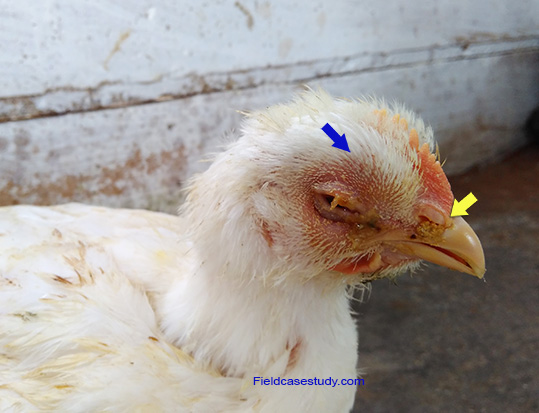In this article by Animal Expert we will explain avian infectious bronchitis, a disease that, although discovered in 1930, remains the cause of countless deaths of infected birds. In fact, it is one of the most common diseases in chickens and roosters, although the virus that causes not only this animal species.
Even today, research is still being done on the development of a vaccine that offers better immunity against this disease, because in addition to being fatal, it is highly contagious, as you will see below. So, if you live with birds and have noticed respiratory symptoms that have made you suspect this problem, read on to learn all about the infectious bronchitis of the chicken, its clinical symptoms and its treatment.
- A bronquite infecciosa das galinhas (BIG) é uma doença viral aguda e altamente contagiosa.
- Causada por um coronavírus pertencente à ordem dos nidovirales.
- Embora seu nome esteja associado ao sistema respiratório.
- Não é o único que esta doença afeta.
- A BIG é capaz de causar danos nos intestinos.
- Rins e sistema reprodutivo.
It is distributed around the world, can infect birds of any age and is not specific to chickens and roosters, as has also been described in turkeys, quails and partridges. Therefore, although many people know the disease as infectious bronchitis in chickens, the truth is that it is a disease that affects different species.
The most important routes of contagion are aerosols and faeces of infected animals. It is a very contagious disease, which can pass very quickly from one bird to another if many of these animals live in the same house. Similarly, the BIG mortality rate is extremely high, so it is so important to take precautions and isolate the infected animal to prevent the contagion of other animals.
BIG is a highly contagious disease, but fortunately it only occurs in birds (and not in all species). Fortunately, this virus is not viable in humans, so BIG is not considered a zoonotic disease. In any case, it is advisable to disinfect the areas that have been in contact with the sick animal, since the human can transport the virus from one place to another and spread it unintentionally, sickening to other birds.
The easiest symptoms to identify are those related to the name of the disease, i.e. respiratory symptoms. You may also notice signs of reproduction, for women, and kidney signs. The following symptoms are important evidence for diagnosing this disease, so these are the most common clinical signs of infectious bronchitis in chickens:
As we have seen, some of the symptoms that may be confused with those of other diseases, such as avian cholera or smallpox, it is therefore necessary to consult the veterinarian urgently.
O diagnóstico dessa doença não é realizado com facilidade nas clínicas, uma vez que apresenta sintomas que também ocorrem em outras doenças. Nesses tipos de casos, deve-se contar com o laboratório para chegar a um diagnóstico preciso e confiável. Em alguns casos, é possível fazer o diagnóstico por isolamento e identificação do vírus da bronquite infecciosa aviária por meio de testes sorológicos. No entanto, este vírus possui certas alterações antigênicas que prejudicam a especificidade do teste, ou seja, os resultados não são 100% confiáveis.
Some authors have described other recently used diagnostic techniques, such as CPR (polymerosis chain reaction). Using this type of molecular genetic techniques, the test has a high specificity and sensitivity, allowing for much more reliable results.
It should be noted that this type of laboratory tests are often costly. However, it is part of the necessary care to go to the veterinary clinic to find the problem that causes the symptoms and treat it.
There is no specific treatment for avian infectious bronchitis. All medications used are used to relieve signs and symptoms, but cannot eliminate the virus. In some cases, symptom control, usually done with antibiotics, can reduce mortality, especially when the disease is diagnosed early. Antibiotics are never prescribed for viral diseases, but they can sometimes help by preventing secondary infections associated with opportunistic bacteria. Of course, this should be the specialist who prescribes antibiotics for infectious bronchitis in chickens. You should never treat your birds yourself, this can worsen the clinical picture.
Prevention and control of this disease is ensured by vaccination and health measures.
Vaccination is the basis for the prevention and control of many diseases. There are two types of vaccines used for BIG and protocols may vary depending on the area where they will be implemented and at the discretion of each veterinarian. This type of avian infectious bronchitis vaccine is generally used:
It is important to remember that the Massachusetts serotype is considered the classic type of infectious bronchitis in chickens and that vaccines based on this type of serotype also offer a degree of protection against other serotypes. Currently, research continues to bring to market a vaccine that can guarantee the protection of any serotype of the disease.
This article is for informational purposes only, in Animal Expert.com.br we cannot prescribe veterinary treatments or make any kind of diagnosis. We suggest that you take your pet to the veterinarian in case of any type of condition or discomfort.
If you would like to read articles similar to, we recommend that you visit our Viral Diseases section.

